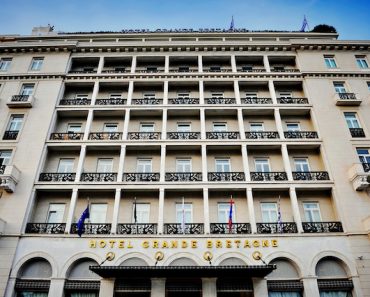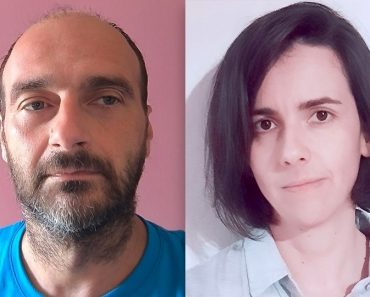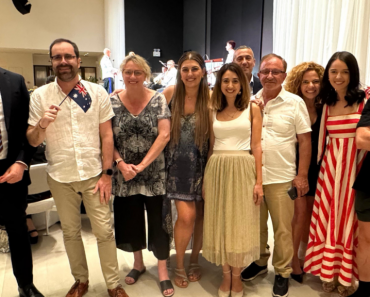The Turkish Republic of Northern Cyprus (TRNC) on Sunday marked the anniversary of the July 20, 1974 Cyprus Peace Operation by Türkiye, a turning point in the history of the Mediterranean island, which is divided between Greek and Turkish Cypriots.
The operation was a display of Türkiye’s unwavering support for the community whose future state is fully recognized only by Ankara. President Recep Tayyip Erdoğan was scheduled to fly to the TRNC to attend ceremonies marking the anniversary.
The operation helped Turkish Cypriots stave off a grim future and paved the way for the establishment of their state in its current form. Fifty-one years on, the operation is an occasion celebrated through military parades and ceremonies and dedicated to those who died in atrocities committed by Greek Cypriot gangs.
Along with attending anniversary ceremonies, Erdoğan is expected to showcase Türkiye’s concrete steps to support the TRNC, including a groundbreaking ceremony for a new hospital supported by the Turkish Ministry of Health and the inauguration of new roads in the city.
The anniversary comes a few days after TRNC President Ersin Tatar and Greek Cypriot leader Nikos Christodoulides met in New York at U.N. headquarters for informal talks on the future of the divided island. They were accompanied by U.N. Secretary-General Antonio Guterres and representatives of the guarantor powers, Türkiye, Greece and the United Kingdom. Talks, held for the second time this year, did not yield any concrete results, but the two sides agreed on confidence-building measures.
Greek Cypriots advocate for the reunification of the island with a bi-communal administrative system, while the TRNC insists on a two-state solution where it will be recognized as a sovereign state.
In the second half of the 20th century, Cyprus was the scene of Greek efforts to erase Turkish Cypriot existence on the island. Fearing a Greek Cypriot plot to unite with Greece, which would ultimately put Turkish Cypriots under the control of Greek Cypriot dominance, Türkiye launched the Cyprus Peace Operation in the summer of 1974.
Cyprus was once an Ottoman island before it was handed over to a British mandate in 1923. Greek Cypriots, encouraged by the Greek uprising against Ottoman rule in 1821, have long aspired for reunification with Greece. In 1955, they took the first steps to achieve this by the establishment of the terrorist group EOKA. EOKA’s campaign of violence targeted Turkish Cypriots, as well as Greek Cypriots opposing their goal of reunification. Turkish Cypriots took up arms in 1958, establishing a resistance organization known as the Turkish Resistance Organization (TMT). Rising tensions on the island appeared to die down in 1960 with the establishment of the Republic of Cyprus. Yet, three years later, Greek Cypriots moved to amend the constitution to deprive Turkish Cypriots of their rights. Armed attacks against the Turkish Cypriot community exacerbated tensions again, effectively putting an end to the bi-national republic. Assaults on Turkish Cypriots in 1963 evolved into an all-out attack by Greek Cypriot forces on Erenköy, a line of resistance by Turkish Cypriots, in 1964. The civilian population was bombed by Greek warplanes, prompting Türkiye to launch a limited air offensive to stave off Greek attacks.
Ten years later, Türkiye took the initiative for a lasting solution to attacks targeting Turkish Cypriots and launched the Cyprus Peace Operation. The operation led to a cease-fire two days later, but ongoing hostilities prompted Türkiye to launch the second stage of the operation on Aug. 14, 1974. The operations cost the lives of 498 Turkish soldiers and 786 Turkish Cypriot “mücahits,” members of paramilitary groups resisting Greek Cypriot attacks. The operation ensured a cessation of attacks by Greek Cypriots, and one year later, Turkish Cypriots declared the Turkish Federated State of Cyprus, under the leadership of Rauf Denktaş, a co-founder of TMT. The state renamed the TRNC in 1983.
The TRNC, however, faced major setbacks as it was not recognized globally and faced economic and political embargoes. It also sought to reconcile with Greek Cypriots, and the two sides agreed upon a series of talks in the early 2000s. Yet, after the Greek Cypriot administration was admitted to the European Union in 2004, efforts collapsed. The last round of concrete talks to end the division failed in 2017.
Under the leadership of President Erdoğan, Türkiye continues to implement policies that provide full support to Turkish Cypriots, although at times it has fallen out with Turkish Cypriot administrations, which have warmed up to the idea of a bi-communal federation. Under Tatar, who came to power in 2020, the TRNC realigned with Ankara and adopted a no-concession policy in talks over the island’s status.
The TRNC will continue to build its future, Tatar said on Friday after the informal talks in New York, underlining that “there are two states” on the Eastern Mediterranean island.
“The existence of these two states has been a reality for 62 years. A solution based on the sovereignty of both peoples in Cyprus is possible,” Tatar told reporters. Tatar said progress could be achieved in Cyprus “through cooperation between the two separate states. We are not avoiding dialogue, but we insist on sovereign equality.”
He noted that the informal meeting did not constitute official negotiations, nor did it indicate a move in that direction, adding that their presence in New York was for cooperation, rather than formal talks. Tatar criticized the EU for appointing a special envoy on Cyprus without consulting the Turkish Cypriot side. He said the bloc holds a biased stance and reaffirmed that Turkish Cypriots would only accept EU involvement if their sovereignty is recognized. “Otherwise, such representation is unacceptable,” he said.
He added that they had met their obligations regarding matters related to the cooperation agreed upon in Geneva (during a meeting last March) and New York with the Greek Cypriot administration, but said no consensus was reached on opening new border crossings due to the Greek Cypriot side’s stance.
Tatar described the Greek Cypriot side’s legal actions against individuals investing in properties in the TRNC as a violation of international law and human rights, calling it an attack that is incompatible with goodwill. He also emphasized that all negotiation processes were being conducted in consultation with Türkiye. Since last year, the Greek Cypriot administration has been pursuing legal action and arrests targeting individuals who purchased property in the TRNC. TRNC officials argue that the true aim behind these actions is to undermine the construction sector and the broader economy. On Sunday, four individuals identified as citizens of the Greek Cypriot administration were detained by police while conducting land surveys and assessments in the TRNC, according to security sources. The suspects were caught by security forces near the town of Iskele while surveying land, police sources said. The suspects were allegedly collecting documents and conducting assessments as part of the Greek Cypriot administration’s ongoing efforts to identify and prosecute those acquiring property in the TRNC. The four detainees are expected to appear in court, while authorities investigate their possible ties to the Greek Cypriot administration’s intelligence agency and determine who may have directed their actions.
Taking root
Today, the peace operation is a source of pride for Turkish Cypriots, while Greek Cypriots mark the same day as a day of mourning for those killed in clashes with Turkish and Turkish Cypriot forces. Greek Cypriot President Christoulides said in a ceremony on Sunday that they would “never yield an inch of land,” while he described the ceremonies in the TRNC as “shameful.”
TRNC Parliament Speaker Ziya Öztürkler said that Greek Cypriots never gave up the idea of annexation with Greece and through the Peace Operation, Turkish Cypriots started taking root in the island. The day is officially known as July 20 Peace and Freedom Day in the TRNC. Öztürkler told Anadolu Agency (AA) on Sunday that the TRNC has made significant progress since the operation, particularly in establishing institutions for infrastructure, education and health care, as well as in “standing for our lands.”
“The flags of the TRNC and the mainland Republic of Türkiye will fly together forever here,” Öztürkler said.
The speaker noted that, thanks to the efforts of Erdoğan, Turkish Vice President Cevdet Yılmaz and Parliament Speaker Numan Kurtulmuş, the TRNC had raised its profile internationally and particularly enhanced relations with the Turkic states.
“The peace operation means independence and freedom for Turkish Cypriots. This is the anniversary of a day where Turkish Cypriots built a freedom epic together with their homeland, Türkiye,” he said. Öztürkler said they fondly remembered the Turkish politicians behind the operation, including then-Prime Minister Bülent Ecevit and Deputy Prime Minister Necmettin Erbakan.
Before his flight to the TRNC, President Erdoğan issued a message on his social media account to celebrate the anniversary and said he wholeheartedly congratulated the Turkish Cypriot people.
“On the 51st anniversary of the Cyprus Peace Operation, I remember with respect our martyrs who gave their lives for the Turkish Cypriot people’s struggle for existence, and I offer my gratitude to our heroic veterans,” Erdoğan said.
One of those veterans is a 75-year-old Cuma Erdem. Erdem was a conscript in the southern Turkish province of Kahramanmaraş when he was deployed to Cyprus for both stages of the operation. He and others boarded a passenger ship to reach the island in the 1974 summer. The ship was among 33 others carrying Turkish troops and came under Greek Cypriot fire when they approached the coast. Erdem and fellow troops crossed the Beşparmak mountains to reach Lefkoşa, with sporadic clashes with Greek Cypriot forces. Along the way, he witnessed fellow troops mowed down by gunfire, and his unit persisted in its march. “On the other side, Greek Cypriot troops started running when we advanced further,” he told AA on Sunday. “We came across Greek Cypriot soldiers tied to their machine guns by their commanders so that they would not flee,” he recounted.
In the second operation, Erdem says he witnessed the aftermath of atrocities committed by Greek Cypriots. He recalls raids by Greek Cypriots on Turkish Cypriot villages, Muratağa, Sandallar and Atlılar. “We heard that they were indiscriminately killing people in an execution style. In one village, we discovered a fresh trail of blood and followed it. We found half-buried bodies of martyrs there. I still remember those moments,” Erdem said.
Cevdet Kürtdur was deployed in a tank unit during the operation. He survived attacks by Greek Cypriots but still bears their scars, including a partial hearing loss. Kürtdur, who was injured when gunfire hit his tank, says he was “honored” to be a veteran. “If they call me again (for deployment), I would go,” he proudly says.
Hasan Aslan, a Turkish army veteran, experiences a mix of joy and grief while remembering the peace operation. Seventy-one-year-old Aslan was among 128 soldiers taking on a well-armed Greek Cypriot regiment. “When the dawn broke on July 20, Turkish reconnaissance planes hovered above us, and then came a barrage of bullets. At one point, we ran out of ammo, and then, paratroopers came to our aid,” Aslan told AA.
One of those paratroopers who landed in the spot he was deployed turned out to be a compatriot. “Bullets were grazing us, but I remember hugging him when I found out that he was from a village neighboring mine in Türkiye. I asked him about the situation in Türkiye, and he told me that people were mobilized and donating to the Turkish army.”
“I am happy to make a small contribution to Cyprus. We showed the world that Turkish Cypriots had the right to exist, and eventually, they managed to establish the TRNC,” he said.






 QuinnBrak:Pixabay.png-370x297.jpg)
